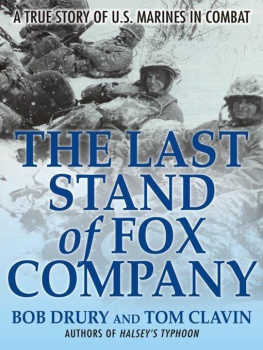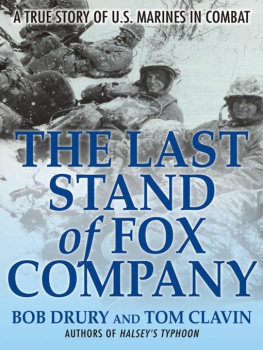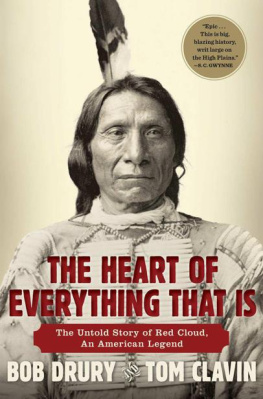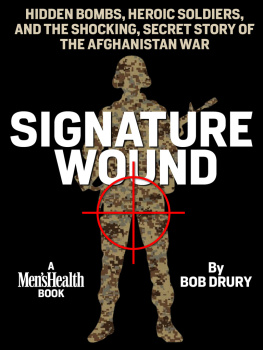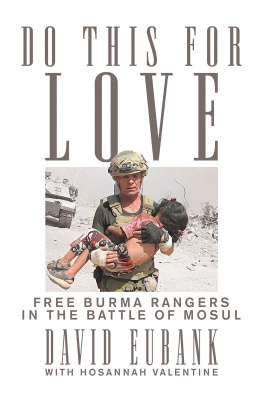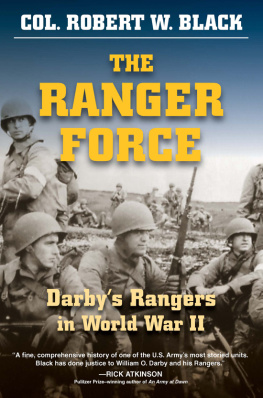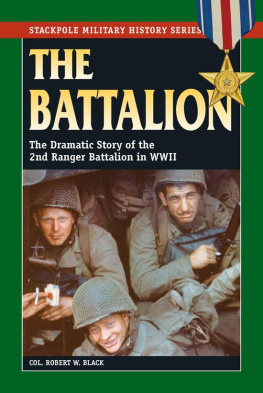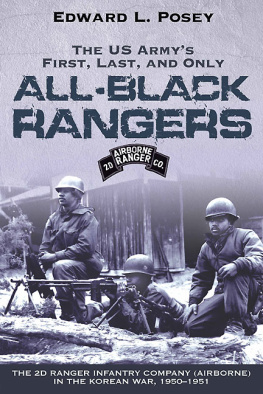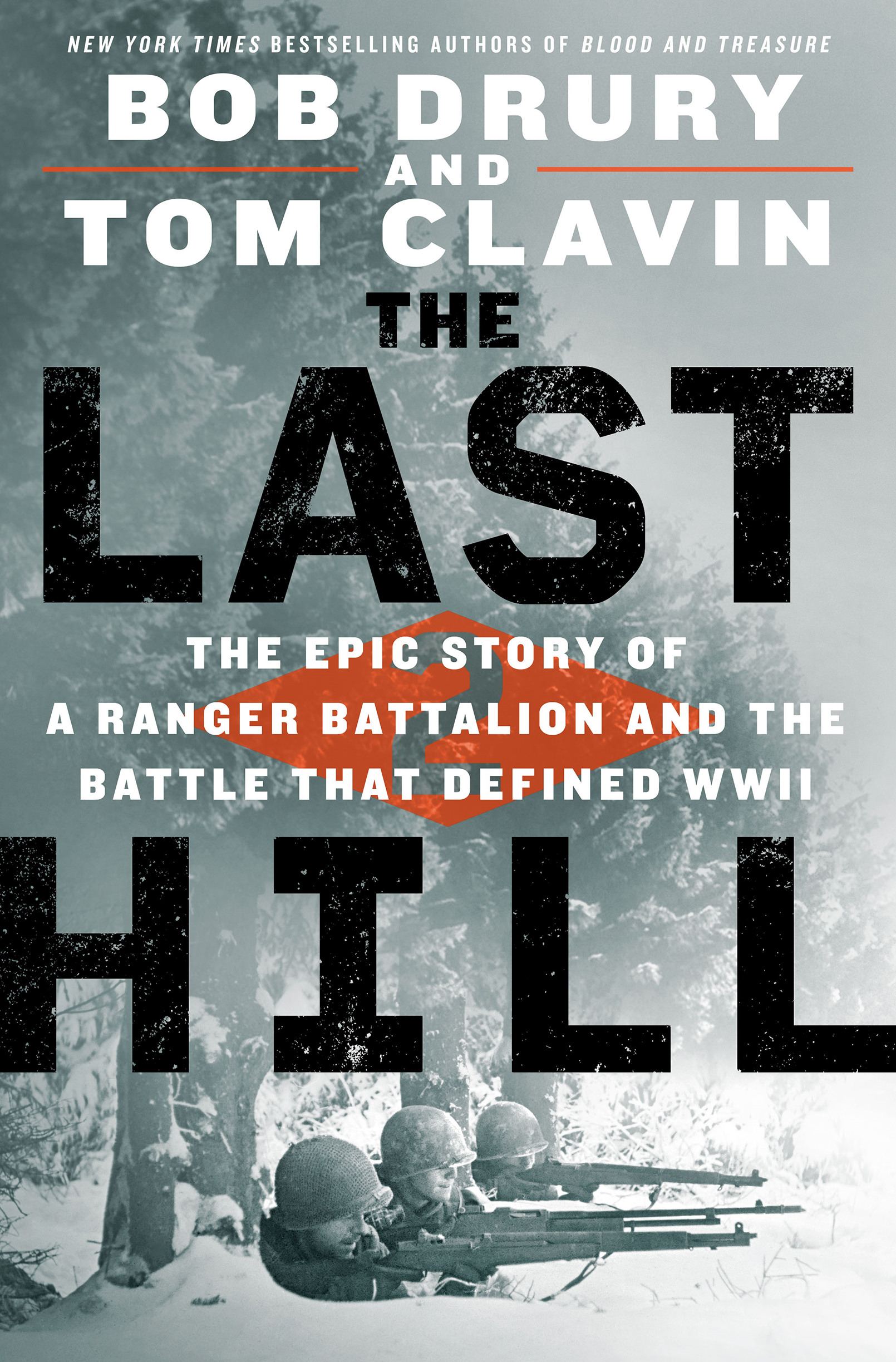Contents
Guide
Pagebreaks of the print version


The author and publisher have provided this e-book to you for your personal use only. You may not make this e-book publicly available in any way. Copyright infringement is against the law. If you believe the copy of this e-book you are reading infringes on the authors copyright, please notify the publisher at: us.macmillanusa.com/piracy.
For Nat Sobel, a Great Good Friend
Rain and snow had turned the roads into lakes of cold and slimy mud. The so-called paved roads, once adequate for peacetime traffic, were beginning to give way under the effect of freezes and thaws and the continuous pounding of tanks and trucks. The smaller lanes, which at best had only a little stone or gravel on them, were no more.
MASTER SERGEANT FORREST POGUE,
U.S. ARMY, WORLD WAR II COMBAT HISTORIAN
Omaha Beach. Pointe du Hoc. Fortress Brest. Crucibles all. None had prepared the men of the United States Armys 2nd Ranger Battalion for the Hrtgen Forest. It was as if they were walking into the imaginations of the Brothers Grimm. With more bloodshed.
The roughly sixty-square-mile patch of densely timbered hills and gorges straddling the Belgian-German frontier screened the southern rim of the ancient fortress of Aachen, the first German city to fall to the Allies in the Second World War. It was at Aachen, more than a millennium earlier, that the emperor Charlemagne had established his seat of power, and his bones were interred there. Had the ghost of the king of the Franks miraculously arisen to greet the American Rangers on the morning of November 14, 1944, he would not have recognized the cheerless slagscape of bombed-out collieries, smashed smokestacks, and blackened railheads that now surrounded the capital city he had known as Aix-la-Chapelle. He would, however, have been quite at home among the pristine Hrtgen conifers whose one-hundred-foot canopy cast the forest floor in shimmering blue shadow, a perpetual twilight even at high noon.
The sodden ground beneath the towering trees was nearly devoid of underbrush, and as the Rangers slogged through ankle-deep mud along a man-made firebreak, they stooped to pass beneath low-hanging pine boughs that lent the woodland a claustrophobic ambience. One trooper, noting the loamy tang rising from the forest floor, likened it to walking into a vast green cave. The utter absence of wildlife, even birdsong, compounded the eeriness. Everywhere the forest scowled, the generally sober U.S. Armys official history records in a jarring flight of anthropomorphism. Wet, cold, and seemingly impenetrable.
The first snowstorm of the season had swept through the Hrtgen a day earlier, and the Rangers had only broached the forests southwestern edge when a relentless mix of sleet and freezing rain again began to fall. According to army meteorologists, there was no end in sight to the grim overcast. The wretched weather blowing in from the west, in fact, portended the most dismal winter recorded in the region in almost a century.
The waning sunlight was near to being swallowed by the night when the Ranger battalion reached the base of their ridgeline bivouac, eleven miles into the wood. The heights loomed not so much to climb but, like Calvary, to suffer. Frost and cold making life so miserable wet snow dogging our every footstep had us all bitching and cursing, the Able Company private first class Morris Prince jotted in his journal. Slime and filth soaked our shoes, and great mud splotches blended into the wetness of our [wool] overcoats.
The raw conditions not only cut to the bone but, as the Rangers knew well, the low cloud cover would continue to prevent Allied aircraft from leaving their tarmacs in liberated Belgium. Over the past thirty days, the number of Army Air Forces and RAF sorties providing close air support to American infantry and armor advancing against the dug-in Germans had fallen by a third. In the coming weeks those prospects appeared even more bleak.
The autumn murk, however, could not obscure the bloody detritus of months of forest fightingthe scattered rucksacks and bullet-riddled helmets; the smashed hulks of burned-out Sherman tanks and jeeps; the blackened corpses of American boys fused together for eternity by direct artillery hits. Near the rotting remains of a German supply horseone of hundreds of thousands killed that autumna Ranger rifleman absentmindedly kicked at a lone American combat boot by the side of the footpath. A foot fell out; the putrescent strips of flesh and muscle still clinging to the bone were thick with maggots. Farther on, dead GIs, bloated and turning gray, were stacked along the trail in haphazard rows, waiting to be tagged and bagged. To the Rangers they appeared to have been speared by medieval pikemen, their bodies punctured and shredded when razor-sharp wooden shards sheared from the treetops by airburst shells rained death on the forest floor. At first a light patter, then a heavy downpour.
The 2nd Ranger Battalion, one of only two American special operations units operating in the European Theater, was a collection of some five hundred recon men and night fighters; cliff climbers and bunker busters; athletes and aesthetes as adept with an M3 trench knife as a .30-caliber machine gun. Led by the rough-hewn former college football star Lieutenant Colonel James Earl Rudder, they thought they had seen the worst of what war had to offer. But as they spiraled deeper into the Hrtgen, even the most battle-scarred among them were staggered by the sight of the soldiers from the U.S Armys 28th Infantry Division they had come to relieve.
After twelve days of continuous combat, the Germans had nicknamed the storied 28th the Blutiger Eimerthe Bloody Bucketa reference to the shape and color of the divisions red keystone badge. It is unlikely that the Wehrmacht soldiers had any idea that the outfits ancestry dated to units stood up by Benjamin Franklin during the Revolutionary War, or that its insignia paid tribute to those origins in Pennsylvania, the Keystone State. Not that it would have mattered. For here, in the Hrtgen, the Bloody Bucketeersas the divisions survivors had sardonically taken to calling themselveshad lived up to the sobriquet.
Less than eight weeks earlier the proud soldiers of the 28th Divisioncombat boots polished, sunlight reflecting off the metallic blue barrels of their M1 rifleshad strutted down the Champs-lyses to the raucous cheers of Parisians crowding the sidewalk. Now, as the Rangers approached, these same GIs emerged from rime-crusted foxholes and tumbledown bunkers like wraiths, their drawn faces tinged ashen, as if dipped in soot. Their eyes were hollow, without expression. Some looked as if daylight would hurt them, others resembled pallbearers in search of a funeral. The foul stench of gas gangrene from infected wounds was omnipresent, permeating the woodland like a crepuscular mist.
There is an ancient battlefield bromide: rarely believe a casualty and never believe a straggler. In this case, the soldiers of the 28th did not have to speak for the Rangers to piece together what had occurred. When the Ranger battalions chief medical officer, Captain Walter E. Doc Block, stumbled into a former German troop shelter that had been converted into an American aid station, he was appalled to find wounded GIs left unattended, their rasping voices pleading for water or, in some cases, to be put out of their misery. Block managed to salvage one of the few working jeeps from the 28ths ravaged motor pool and, after jury-rigging a litter to the vehicle, he and his aid men stuffed their musette bags with bandages, plasma, and temporary splints and began combing the forest in search of more wounded. Picking their way through random artillery and small-arms fire, avoiding impassable roads and keenly aware that German sappers had rigged the trailside trees with mines, they managed to gather nineteen more survivors before Lt. Col. Rudder called a halt to their efforts.


